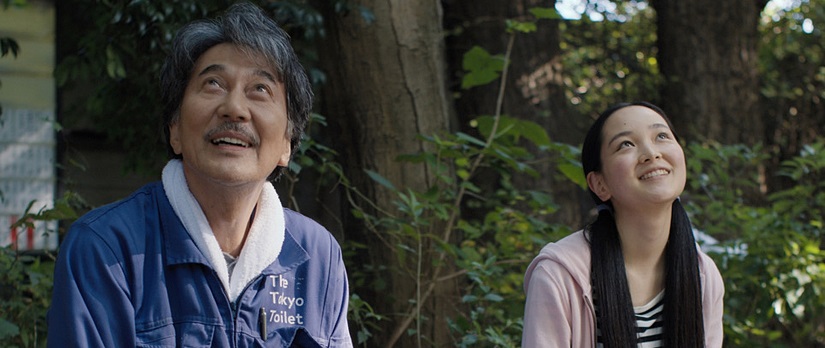From Wim Wenders (Paris, Texas, Wings of Desire) and collaborator Takuma Takasaki comes a beautiful film about a quiet, unassuming public toilet cleaner in Tokyo, Japan, who enjoys simple pleasures and has the time, heart, and mind to appreciate beauty in this world in various forms. Writer/director Wenders and co-writer Takasaki do an excellent job presenting this portrait of someone who seems unremarkable on the surface but radiates a soft and luminous beauty from within. Actor Koji Yakusho stars as the protagonist, Hirayama, and has few spoken lines in the film. He expresses his feelings through his body language, facial expressions, and the occasional release of intense emotions.
Though Hirayama works a thankless job as a public toilet cleaner, he puts much heart and pride into his work. While many people would dread waking up daily to tackle this type of job, Hirayama happily awakens every morning, as if thankful for being alive for a brand new day, and proceeds to go about strictly structured rituals that he performs, mostly without fail all the time. The film follows the humble man daily while he works hard cleaning. He also enjoys different kinds of music, taking photos of nature (particularly trees), and reading various books before he turns in. Though most of his days are somewhat uneventful, life occasionally throws Hirayama an expected curveball his way.
Now, I know this movie sounds very repetitive as protagonist Hirayma repeats his routine so many times, but that aspect is an essential element of this movie. Hirayama enjoys his uneventful life. It is mostly stress and drama-free. When things change a little too much, this throws Hirayama off his journey of peace and happiness. Wenders, Takasaki, and Koji Yakusho portray Hirayama as a man who has found paradise for himself despite what most people think of his work.
It isn’t so much about the nasty aspects of his work that make Hirayama so happy; it is the fact that it is primarily pressure-free work that allows him to placidly enjoy the things he indeed finds beautiful in this world–nature, music, people-watching, and literature. What a lot of people who encounter him and misunderstand him is that he is in a state of Zen, as long as he can carry about his work and enjoy his simple pleasures. It truly is a beautiful thing to experience. And even when Hirayama must face a significant change or disruption to his routine, he still manages to calmly and collectively do what is necessary and proper.
Perfect Days is an arthouse film (in all of the best ways), so I know it will not appeal to everyone’s tastes. Still, I challenge anyone who is usually uncomfortable with this kind of movie to give it a chance. If audiences allow themselves to be immersed in Hirayama’s world and follow his journey, several people will somehow finish this film moved or touched. At the very least, people should appreciate that Hirayama has excellent taste in music.
Perfect Days is currently playing in select theaters. For my Austin, Texas readers, it opens this weekend at the AFS Cinema.
